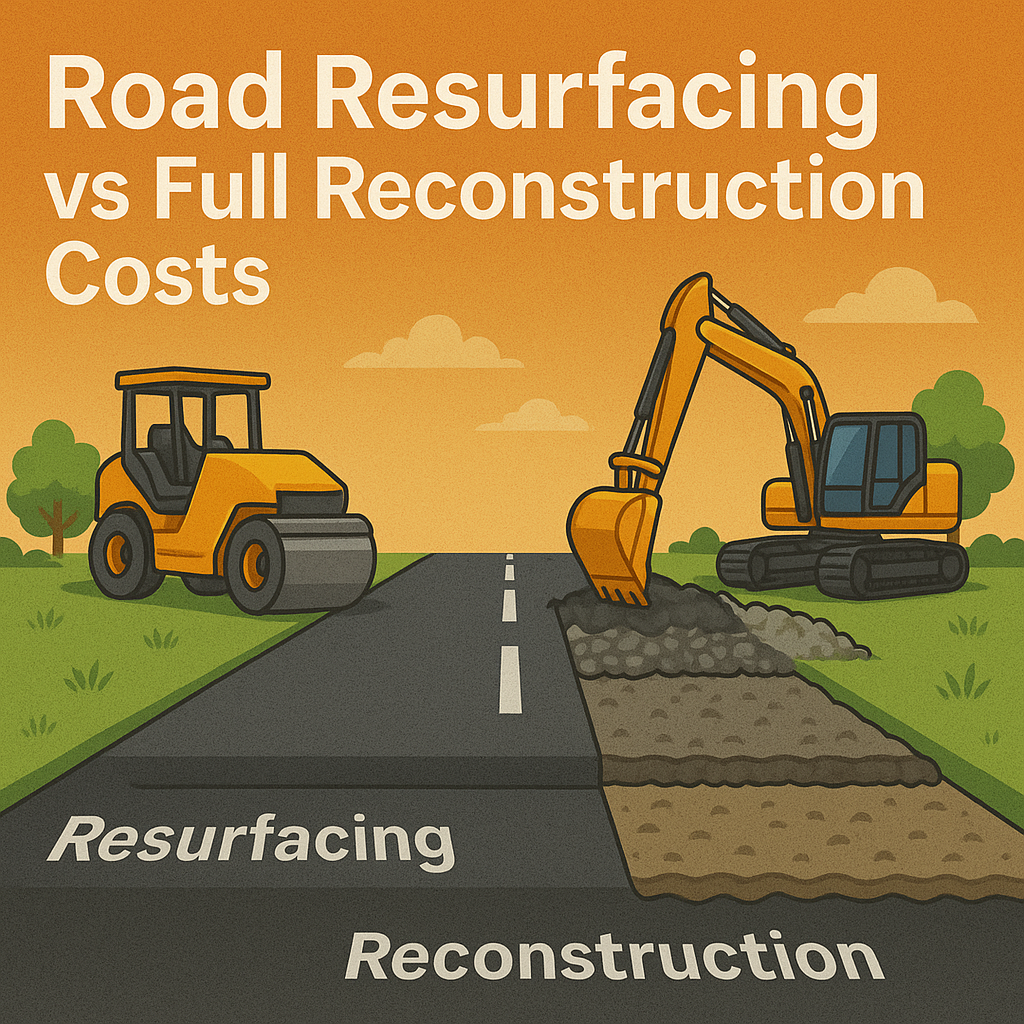Road Resurfacing vs Full Reconstruction Costs: Complete 2024 Analysis Guide
Choosing between road resurfacing and full reconstruction represents one of the most critical decisions in pavement maintenance planning. Understanding road resurfacing costs versus complete reconstruction expenses helps property owners, municipalities, and contractors make informed decisions that balance immediate budget constraints with long-term infrastructure needs.
Road resurfacing costs typically range from $2-5 per square foot, while full reconstruction can cost $8-15 per square foot depending on existing conditions and local material prices. However, the decision involves more than simple cost comparison – factors like underlying base condition, traffic volume, and expected lifespan significantly impact the most economical choice.
This comprehensive analysis examines both options’ costs, benefits, and ideal applications, providing the data needed to select the optimal pavement solution for your specific situation and budget requirements.
Understanding Road Resurfacing Options and Costs
What is Road Resurfacing?
Road resurfacing involves applying new asphalt layer over existing pavement without disturbing the underlying base structure. This process addresses surface-level issues like cracking, minor settling, and wear while preserving the foundational infrastructure. Road resurfacing costs significantly less than full reconstruction, making it attractive for budget-conscious projects.
The resurfacing process typically involves surface preparation, crack sealing, and application of 1.5-3 inches of new asphalt. Surface milling may be required to maintain proper elevation, adding to overall road resurfacing costs but ensuring proper drainage and curb relationships.
Resurfacing Cost Breakdown
Material costs comprise the largest expense in road resurfacing projects, typically accounting for 60-70% of total costs. Asphalt prices fluctuate based on oil prices and local market conditions, generally ranging from $100-150 per ton delivered. Labor costs vary regionally but average $50-80 per hour for skilled paving crews.
Equipment costs include milling machines, pavers, and compaction equipment. Rental rates for standard paving equipment range from $500-1,500 per day depending on project scope and duration. Larger projects achieve better cost efficiency through equipment utilization optimization.
Additional expenses include traffic control, permits, and material testing requirements. These ancillary costs typically add 15-25% to base road resurfacing costs but are essential for safe, compliant project execution.
Full Road Reconstruction: Process and Investment
When Reconstruction Becomes Necessary
Full reconstruction becomes the optimal choice when existing pavement shows structural failure, extensive base deterioration, or repeated surface treatment failures. Pavement reconstruction addresses underlying issues that resurfacing cannot resolve, providing long-term solutions for severely compromised roadways.
Signs indicating reconstruction necessity include extensive alligator cracking, significant settling, base failure, and drainage problems. These conditions require complete removal and replacement of pavement layers to achieve acceptable performance standards.
Reconstruction Cost Components
Excavation and disposal costs represent major expense categories in full reconstruction projects. Removing existing pavement and disposing of materials typically costs $3-6 per square foot depending on thickness and disposal facility locations. Environmental regulations may increase disposal costs for contaminated materials.
Base preparation involves installing proper foundation materials, typically requiring 6-12 inches of compacted aggregate base. Quality base materials cost $25-40 per cubic yard delivered, while installation labor adds $15-25 per cubic yard to project costs.
New pavement installation follows base completion, with costs similar to new construction ranging from $4-8 per square foot for standard thickness applications. Premium materials or specialized applications increase these baseline costs accordingly.
Cost-Benefit Analysis: Making the Right Choice
Short-term vs Long-term Financial Impact
Immediate cost savings favor resurfacing for projects with limited budgets or adequate underlying structure. Road resurfacing costs provide immediate improvement at fraction of reconstruction expense, extending pavement life 8-15 years under normal conditions.
However, long-term analysis may favor reconstruction when repeated resurfacing becomes necessary. Reconstruction provides 20-30 year service life, potentially offering better value than multiple resurfacing cycles over equivalent timeframes.
Consider total cost of ownership including maintenance requirements, traffic disruption costs, and performance expectations when evaluating options. Quality reconstruction reduces ongoing maintenance needs compared to resurfaced pavements over marginal base conditions.
Traffic volume significantly influences optimal choice between resurfacing and reconstruction. High-traffic areas benefit from reconstruction’s superior structural capacity, while low-traffic roads may perform adequately with quality resurfacing over sound base materials.
Existing condition assessment requires professional evaluation to determine base stability, drainage adequacy, and structural integrity. Core sampling and deflection testing provide objective data for informed decision-making beyond surface appearance.
Budget timing affects project approach – available funding may dictate immediate resurfacing with planned future reconstruction, or delayed single reconstruction project depending on financial constraints and priority scheduling.
Regional Cost Variations and Market Factors
Geographic Price Differences
Regional material costs vary significantly across different markets due to aggregate availability, transportation distances, and local competition levels. Urban areas typically experience higher labor costs but may benefit from material proximity and equipment availability.
Rural projects often face higher transportation costs for materials and equipment but may achieve labor cost savings. Understanding local market conditions helps establish realistic budget expectations for either resurfacing or reconstruction approaches.
Timing and Seasonal Considerations
Construction season impacts both availability and pricing for road resurfacing and reconstruction projects. Peak season demand increases costs while off-season scheduling may provide cost savings but weather risk considerations.
Material prices fluctuate seasonally and with broader economic conditions. Oil price volatility directly affects asphalt costs, while aggregate prices respond to local construction activity levels and supply chain conditions.
Choosing between road resurfacing and full reconstruction requires careful analysis of current conditions, budget constraints, and long-term objectives. While road resurfacing costs offer immediate savings, reconstruction provides superior long-term value for severely compromised pavements. Professional assessment ensures optimal decision-making for your specific pavement situation.
Ready to evaluate your pavement options? Contact ConstructMetrics.com for expert assessment and cost analysis tailored to your project requirements and budget parameters.
Calculate asphalt quantities and costs for your projects with precision
